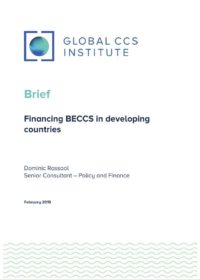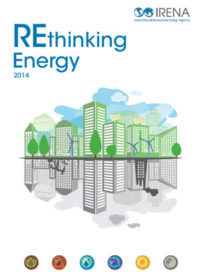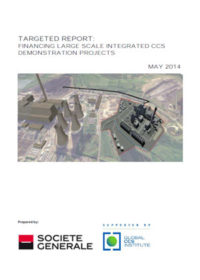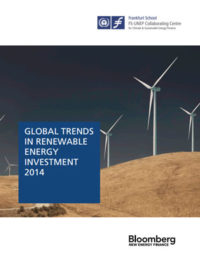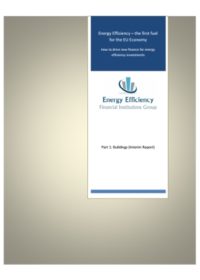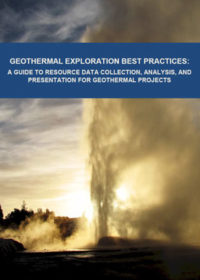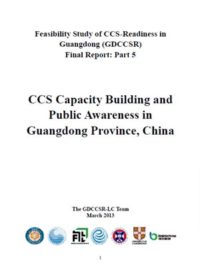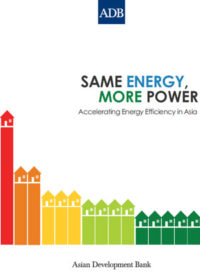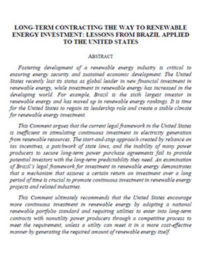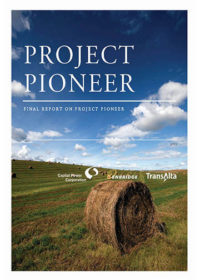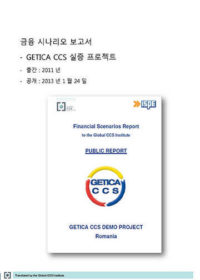Resources
Publications
Our publications, reports and research library hosts over 500 specialist reports and research papers on all topics associated with CCS.
View our Publication Library Disclaimer.
Filter by
Financing BECCS in developing countries
11th February 2019
Organisation(s): Global CCS Institute
Topic(s): Bioenergy with carbon capture and storage (BECCS), Bioethanol, Project financing
Bioenergy with carbon capture and storage (BECCS) is a promising class of technologies for carbon dioxide (CO2) removal and consists of the capture and permanent geological storage of CO2 stemming from biomass transformation or combustion. Several industrial sectors can implement this technology, including the biofuel sector which is predominantly made up of bioethanol production. Bioethanol is one of the few renewable alternatives to oil and gas-based liquid fuel, with which it can be easily blended to be used as a transportation fuel.
As countries seek to decarbonise transport, demand for bioethanol is set to grow globally. By integrating CCS into the production process for bioethanol, negative emissions can be created. It is forecast that a significant proportion of the world’s bioethanol production will come from developing countries (International Energy Agency, 2018).
This brief focuses on how the production of bioethanol with CCS can be supported by climate finance providers, and the pivotal role Brazil can play in facilitating this process.
CCS Policy Indicator (CCS-PI)
16th October 2018
Organisation(s): Global CCS Institute
Topic(s): Carbon capture use and storage (CCUS), Economics, Policy law and regulation, Project financing
Government policy, given effect through law and the allocation of public resources, is critical to achieving climate targets. It plays a material role in determining the return on investment for any climate mitigation technology making confidence in government policy a pre-requisite of investment.
The CCS-PI tracks the development of government policy to accelerate the deployment of CCS as an essential climate mitigation technology in over 100 countries.
Disclaimer
The content within the Global CCS Institute Publications, Reports and Research Library is provided for information purposes only. We make every effort and take reasonable care to keep the content of this section up-to-date and error-free. However, we make no claim as to its accuracy, currency or reliability.
Content and material featured within this section of our website includes reports and research published by third parties. The content and material may include opinions and recommendations of third parties that do not reflect those held by the Global CCS Institute.
REthinking energy: towards a new power system
28th September 2014
Topic(s): Project financing, Renewables
IRENA’s Rethinking Energy series explores the changes that are transforming the way energy is produced and used, and how this affects governments, businesses and individual citizens.
The first edition of REthinking Energy focuses on the power sector. It describes the trends driving this change, how the technology is evolving, who is financing it, and the wider benefits it will bring. Finally, it examines what an energy system powered by renewables might look like and how policy makers can further support the transformation.
Disclaimer
The content within the Global CCS Institute Publications, Reports and Research Library is provided for information purposes only. We make every effort and take reasonable care to keep the content of this section up-to-date and error-free. However, we make no claim as to its accuracy, currency or reliability.
Content and material featured within this section of our website includes reports and research published by third parties. The content and material may include opinions and recommendations of third parties that do not reflect those held by the Global CCS Institute.
Targeted report: financing large scale integrated CCS demonstration projects
1st May 2014
Topic(s): Carbon capture use and storage (CCUS), Project financing
In this report Societe Generale examines the international finance community to determine the awareness, understanding and appetite for financing carbon capture and storage projects with debt. Undertaken on behalf of the Global CCS Institute to broaden understanding on carbon capture and storage (CCS) issues, this report assists those in the decarbonisation arena to understand perceptions of debt finance. The project was led by Allan Baker, who has been involved in the CCS sector for the past five years, particularly in respect of bringing finance related issues to the attention of the policy and decision makers in the industry around the world. He was able to draw on this experience in addition to the experience and contacts built up over his 20-plus years in the project finance area, to provide a useful insight into how the finance community perceives CCS and the major issues that could stand in the way of financing such projects.
Disclaimer
The content within the Global CCS Institute Publications, Reports and Research Library is provided for information purposes only. We make every effort and take reasonable care to keep the content of this section up-to-date and error-free. However, we make no claim as to its accuracy, currency or reliability.
Content and material featured within this section of our website includes reports and research published by third parties. The content and material may include opinions and recommendations of third parties that do not reflect those held by the Global CCS Institute.
Global trends in renewable energy investment 2014
22nd April 2014
Topic(s): Project financing, Renewables
This 2014 edition of the Frankfurt School-UNEP Collaborating Centre for Climate & Sustainable Energy Finance’s annual investment report describes developments in the financing of renewable power and fuels. The document uses statistics, charts and narrative, to explore the issues affecting each type of investment, technology, and region.
This report is the result of a joint analysis by the Frankfurt School-UNEP Collaborating Centre, the United Nations Environment Programme (UNEP) and Bloomberg New Energy Finance (BNEF).
Disclaimer
The content within the Global CCS Institute Publications, Reports and Research Library is provided for information purposes only. We make every effort and take reasonable care to keep the content of this section up-to-date and error-free. However, we make no claim as to its accuracy, currency or reliability.
Content and material featured within this section of our website includes reports and research published by third parties. The content and material may include opinions and recommendations of third parties that do not reflect those held by the Global CCS Institute.
Energy efficiency – the first fuel for the EU economy: how to drive new finance for energy efficiency investments. Part 1: buildings (interim report)
2nd April 2014
Topic(s): Economics, Energy efficiency, Project financing
This interim report, prepared for the European Commission by the Energy Efficiency Financial Institutions Group, describes and addresses the need to increase the scale of energy efficiency investments across the European Union. Buildings are key energy consumers and greenhouse gas emitters - this report shows value in energy efficient investments in buildings that save energy and improve buildings’ financial performance.
Disclaimer
The content within the Global CCS Institute Publications, Reports and Research Library is provided for information purposes only. We make every effort and take reasonable care to keep the content of this section up-to-date and error-free. However, we make no claim as to its accuracy, currency or reliability.
Content and material featured within this section of our website includes reports and research published by third parties. The content and material may include opinions and recommendations of third parties that do not reflect those held by the Global CCS Institute.
Geothermal exploration best practices: a guide to resource data collection, analysis, and presentation for geothermal projects
1st February 2014
Topic(s): Geothermal energy, Project financing, Renewables
Exploration best practices for any natural resource commodity should aim to reduce the resource risk prior to significant capital investment, for a fraction of the cost of the planned investment. For geothermal energy, the high risks cost of proving the resource is one of the key barriers facing the industry. This guide lays out best practices for geothermal exploration to assist geothermal developers and their contractors to address these risks in a cost-sensitive manner, raising project quality. Companies that can demonstrate that their project has followed such best practices will find it easier to access finance. In the same way, this guide will be of use to financers of geothermal projects, assisting the assessment of projects to ensure project risks have been addressed.
Disclaimer
The content within the Global CCS Institute Publications, Reports and Research Library is provided for information purposes only. We make every effort and take reasonable care to keep the content of this section up-to-date and error-free. However, we make no claim as to its accuracy, currency or reliability.
Content and material featured within this section of our website includes reports and research published by third parties. The content and material may include opinions and recommendations of third parties that do not reflect those held by the Global CCS Institute.
CCS capacity building and public awareness in Guangdong Province, China
18th October 2013
Topic(s): Capacity development, Carbon capture use and storage (CCUS), Project financing, Public engagement
Based on the outcomes of our study, the GDCCSR project has shown the necessity, and provided feasible solutions, for the development of CCS and CCSR in Guangdong, and drafted a roadmap that includes action plans and policy recommendations. We would like to share our experience in promoting regional CCS developments, enhancing knowledge exchange, and building up local expertise. In order to implement CCS in Guangdong and other parts of China in the future, we consider that extra work is required to disseminate the findings of this project more widely.
The capacity building activities, based on experiences from other researchers, were usually focussed on: workshops; personnel exchange programs; technical assistance for planned pilot CCS activities; information exchange; facilitation of technology transfer; training programs; study tours on regulations and standards; summer school programs; information and knowledge sharing programs; support for feasibility studies; and providing opportunities for engineers to work on CCS demonstration projects. The GDCCSR project team has been working on various activities in Guangdong, such as CCS meetings & workshops, information and knowledge sharing websites & blogs, information exchange with experts from industrial companies, visiting power plants etc. In the future, we are aiming to take further action and employ other methods to continue capacity building activities.
Disclaimer
The content within the Global CCS Institute Publications, Reports and Research Library is provided for information purposes only. We make every effort and take reasonable care to keep the content of this section up-to-date and error-free. However, we make no claim as to its accuracy, currency or reliability.
Content and material featured within this section of our website includes reports and research published by third parties. The content and material may include opinions and recommendations of third parties that do not reflect those held by the Global CCS Institute.
Same energy, more power: accelerating energy efficiency in Asia
10th October 2013
Topic(s): Economics, Energy efficiency, Policy law and regulation, Project financing
This ADB report identifies a 1%–4% investment in energy efficiency, as a share of overall energy sector investment, can meet as much as 25% of the projected increase in primary energy consumption in developing Asian countries by 2030. This cost-effective investment, in turn, can boost regional energy security by tempering the need for imported energy, as most countries in the region, 2 decades from now, will produce 50% or less of the energy they require. More generally, robust deployment of energy efficiency can relieve pressure on existing energy infrastructure while reducing emissions and other pollutants that harm air quality and contribute to climate change.
This report identifies key areas of interest for accelerating energy efficiency investments. The report also examines global and regional trends that are driving Asia’s energy demand and the resulting policy and regulatory environment for energy efficiency.
Disclaimer
The content within the Global CCS Institute Publications, Reports and Research Library is provided for information purposes only. We make every effort and take reasonable care to keep the content of this section up-to-date and error-free. However, we make no claim as to its accuracy, currency or reliability.
Content and material featured within this section of our website includes reports and research published by third parties. The content and material may include opinions and recommendations of third parties that do not reflect those held by the Global CCS Institute.
Long-term contracting the way to renewable energy investment: lessons from Brazil applied to the United States
11th July 2013
Topic(s): Project financing, Renewables
This comment from Emory Law Journal argues that the current legal framework in the United States is inefficient in stimulating continuous investment in electricity generation from renewable resources. The start-and-stop approach created by reliance on tax incentives, a patchwork of state laws, and the inability of many power producers to secure long-term power purchase agreements fail to provide potential investors with the long-term predictability they need. An examination of Brazil’s legal framework for investment in renewable energy demonstrates that a mechanism that assures a certain return on investment over a long period of time is crucial to promote continuous investment in renewable energy projects and related industries.
Disclaimer
The content within the Global CCS Institute Publications, Reports and Research Library is provided for information purposes only. We make every effort and take reasonable care to keep the content of this section up-to-date and error-free. However, we make no claim as to its accuracy, currency or reliability.
Content and material featured within this section of our website includes reports and research published by third parties. The content and material may include opinions and recommendations of third parties that do not reflect those held by the Global CCS Institute.
Project Pioneer: final report on Project Pioneer
29th April 2013
Topic(s): Business cases, Carbon capture use and storage (CCUS), Project financing
After completion of a feasibility study and despite substantial government and industry investment, the Project was not economically feasible due to insufficient CO2 sales markets and emissions pricing in Alberta and Canada.
Disclaimer
The content within the Global CCS Institute Publications, Reports and Research Library is provided for information purposes only. We make every effort and take reasonable care to keep the content of this section up-to-date and error-free. However, we make no claim as to its accuracy, currency or reliability.
Content and material featured within this section of our website includes reports and research published by third parties. The content and material may include opinions and recommendations of third parties that do not reflect those held by the Global CCS Institute.
금융 시나리오 보고서 – GETICA CCS 실증 프로젝트
11th April 2013
Topic(s): Carbon capture use and storage (CCUS), Project financing
루마니아의 전력 발전은 주로 석탄에 의존하고 있기 때문에, CCS를 사용하면 화력발전소를 계속 가동하면서CO2 배출량을 크게 감소시킬 수 있다.
이 금융 시나리오 보고서는 대규모 CCS 프로젝트를 위한 최적의 해법을 분석하고 있는데, 이 프로젝트를 위한 재무 자원을 찾고 확보하는 문제를 다루고 있다.
현재 확보한 자금원은 유럽연합 및 국가 차원의 자금이며, 프로젝트 금융 구조의 적합성, 프로젝트의 자격, 자금의 출처(공공/민간), 자금의 유효성, 시간의 유효성과 확신의 정도를 분석하였다.
세 개의 시나리오는 CCS 프로젝트를 위한 자금원의 가능성을 기반으로 완성되었다. 질적 평가가 실시되었으며, 이 평가를 바탕으로 최고의 시나리오가 선정되었다.
제안된 금융 시나리오는 NER 300보조금과 유럽연합의 배출권 거래 제도(EU ETS)의 경매 소득에 근거하였다. 투자비를 충당할 수 있는 그 외 다른 자금원은 소규모의 보조금들과 주식 발행, 그리고 대출이다. 이 시나리오는 가장 성공 가능성이 높은 자금원들을 조합한 것이며, Getica 프로젝트가 진행되는 동안 실행 비용 및 운영, 금융 비용이 충당될 것이다.
Disclaimer
The content within the Global CCS Institute Publications, Reports and Research Library is provided for information purposes only. We make every effort and take reasonable care to keep the content of this section up-to-date and error-free. However, we make no claim as to its accuracy, currency or reliability.
Content and material featured within this section of our website includes reports and research published by third parties. The content and material may include opinions and recommendations of third parties that do not reflect those held by the Global CCS Institute.
